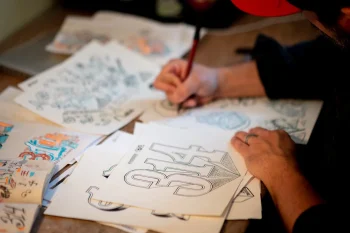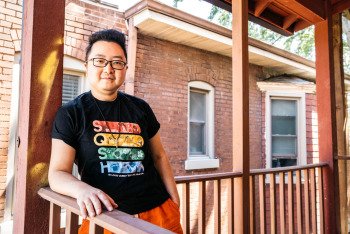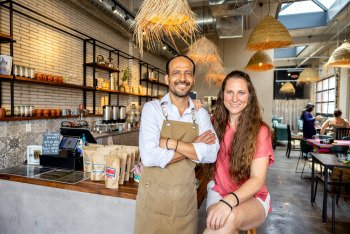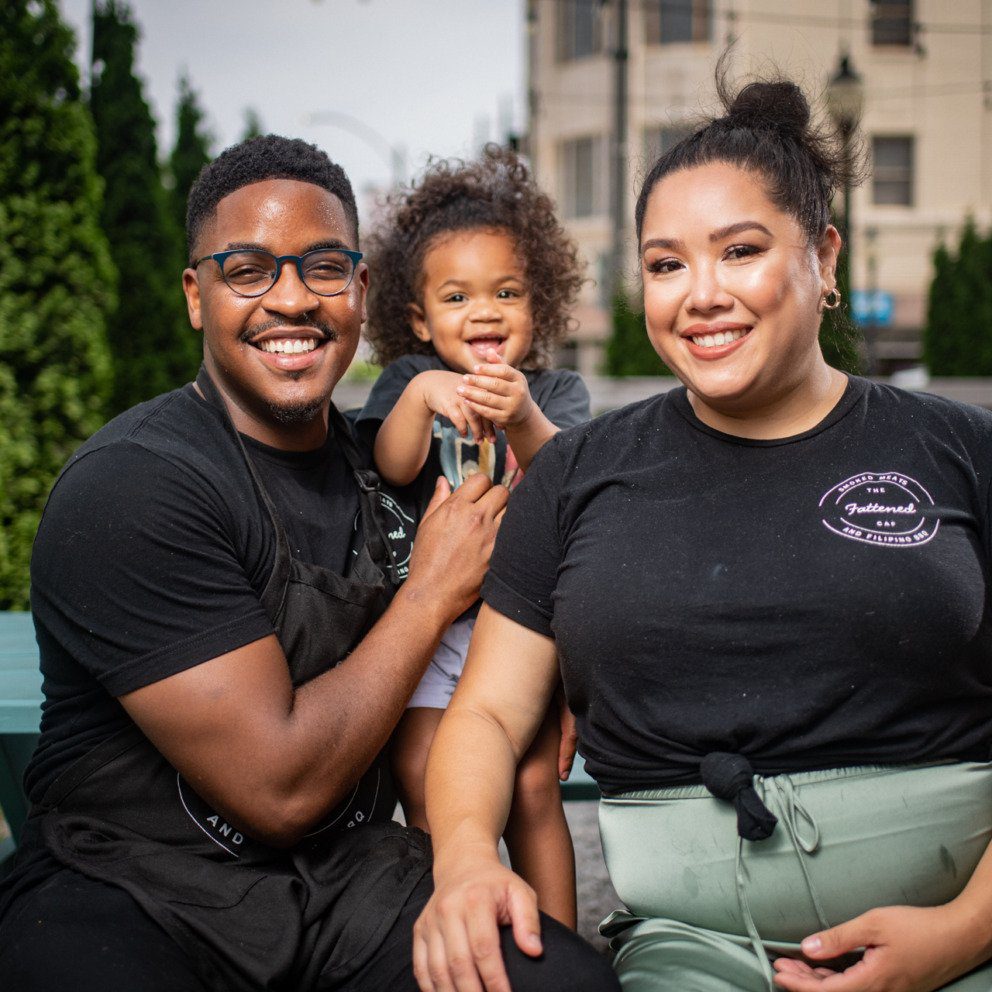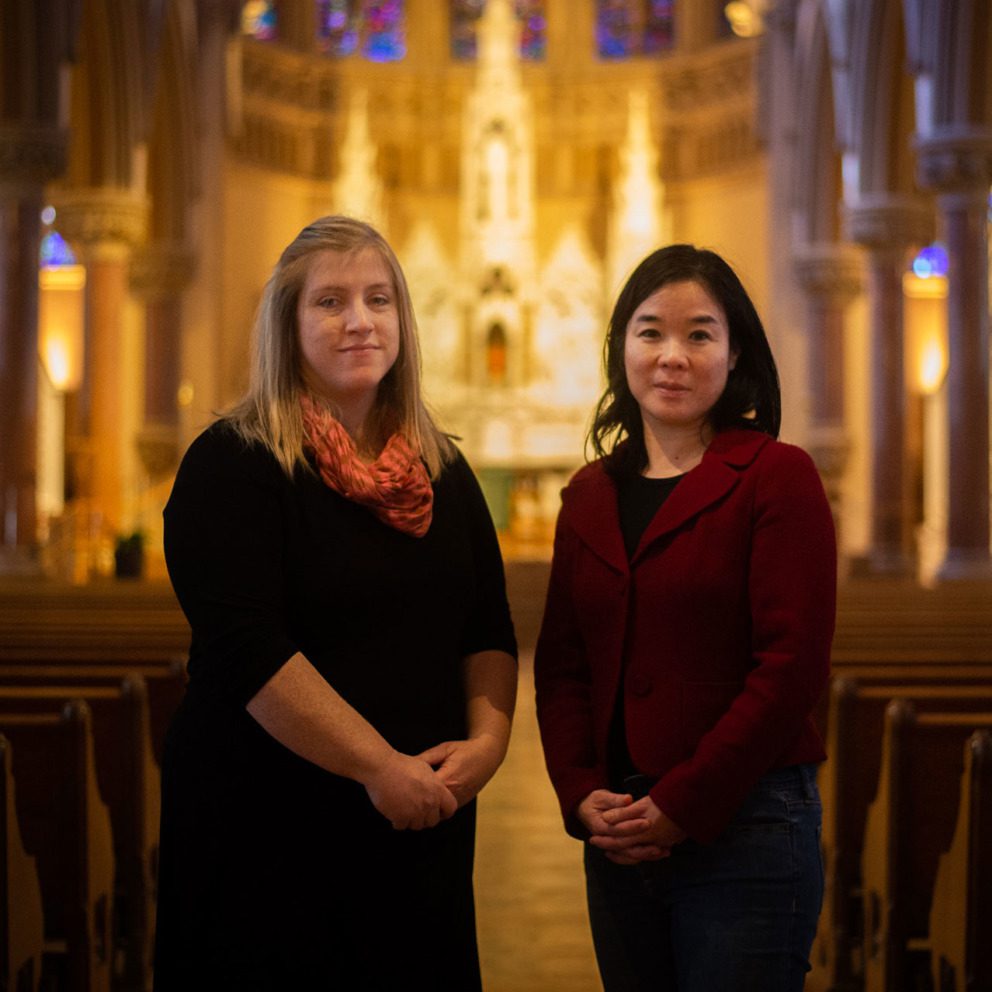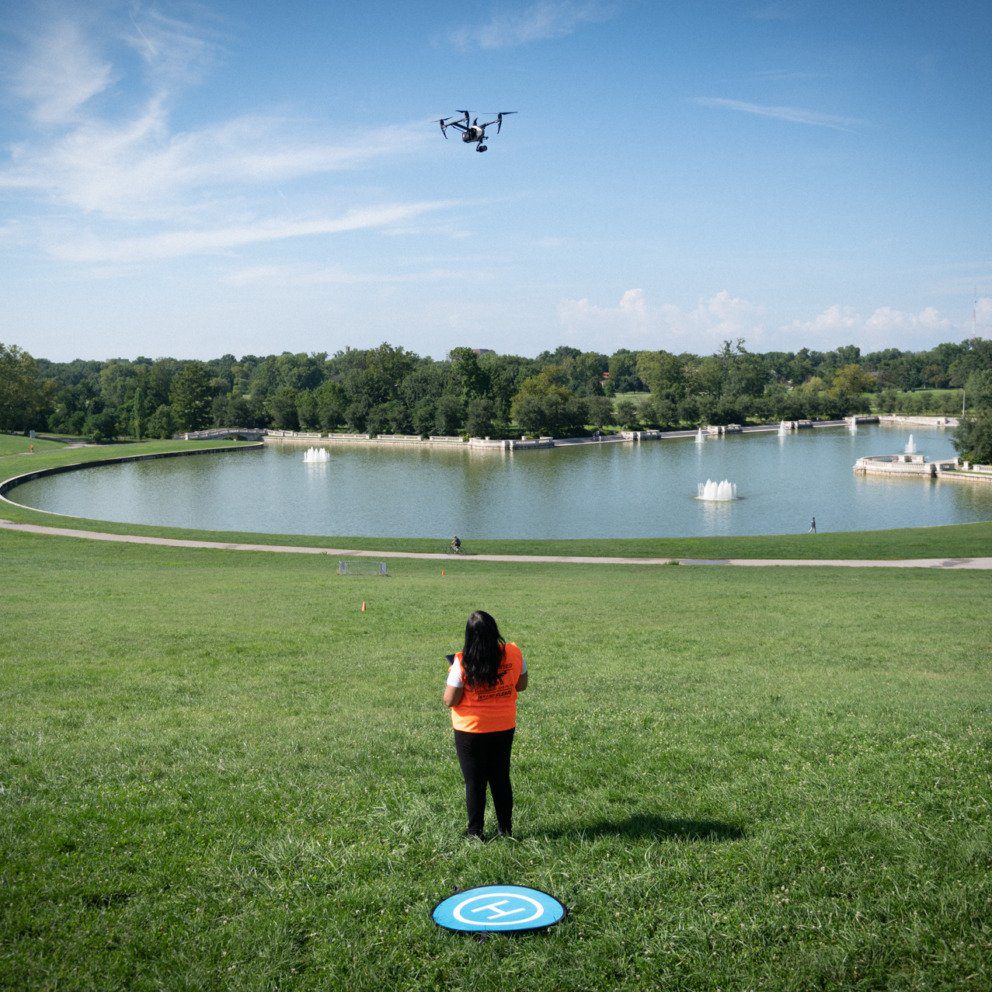Empowering
Women
In Fox Park, nonprofit Rung for Women helps women take their personal and professional lives to the next level.
If there’s a common refrain from the members at Rung for Women, it’s that they were stuck. At its core level, the south St. Louis city nonprofit helps women get, well, unstuck.
“All those things that you saw as a roadblock in your life are going to be removed when you’re here,” says member Amira Harris, who applied to the program in early 2020, while unemployed and pregnant. She initially thought Rung was a cool-looking coworking space after her partner sent her a link about it on Instagram, but soon discovered it was much more.
Rung provides a holistic program of support for women to elevate their lives, including career advancement in one of three pathways (geospatial, tech and advanced manufacturing) . Applications are open to anyone who identifies as female, has a $50,000 personal (not household) or less income, is interested in full-time employment, speaks English, has a high school diploma or equivalent, employment and stable housing history of at least six months, and is able to attend in person in south city.
Rung first launched in 2010 as a retail store in Rock Hill by Ali Kindle and Mallarie Zimmer, aimed at providing affordable consignment business clothes to women. After several years of community and nonprofit initiatives, Rung shifted gears and closed its boutique in 2017. Rebranding as Rung for Women, the organization began partnering with local organizations including LaunchCode, Provident Behavioral Health, Prosperity Connection, Urban Harvest STL, Family Care Health Centers, Safe Connections and The Collective STL to provide a holistic suite of services aimed at helping women in their careers and beyond. Rung for Women opened the doors to its campus in August 2020, and its inaugural members started their journey in March 2021.
When accepted, women can access Rung’s holistic program of support at no cost to them, including child care, meals, doctors’ appointments, yoga classes, financial support services and more, all on Rung’s campus in Fox Park.
“It gives me such peace of mind to know that I can come here and set up a day,” says member Tangela Williams. “I’ll have a doctor’s appointment. I’ll see my career counselor. I’ll see the gym trainers, and have a meal waiting – so I don’t have to worry about that. I can bring my kids; they can hang out and play, and I know that they’re safe, it doesn’t cost me a thing, and we get everything we need.
“It frees me up to be a person instead of just a mom or an employee.”
Williams, who’s been a member of Rung for about eight months, is finishing her master’s degree in special education, as well as completing the geospatial analyst training at Maryville University through a partnership between the university and Rung. She’s already been able to make connections with women in the geospatial industry.
“Geospatial is definitely a growing field in St. Louis,” she says. “It already is a big hub, and there are more companies moving in as the workspace is shifting to a more digital landscape. A lot of companies are finding the room to put down roots in St. Louis; there’s jobs opening up all the time. It’s really exciting, the growth that’s going to be in the next five to 10 years here with the geospatial industry.”
Rung developed the geospatial analyst program, in collaboration with Maryville and companies T-Kartor, Maxar and L3Harris, to prepare women for some of the 3,000 jobs in the region anticipated when the National Geospatial-Intelligence Agency West headquarters opens in 2025. While women occupy nearly half of the overall workforce in the U.S., they make up only 35 percent of the technology workforce.
“At Rung, we are all about more women making more money,” says Leslie Gill, Rung for Women president. “For generations, traditionally male-dominated industries have earned a higher wage than those that are female-dominated. By creating intentional pathways for women to enter into these good-paying jobs, along with the wrap-around support they need to succeed, our region is making a bold commitment to inclusive growth and opportunity for all.”
Harris now works at Square, but she stresses that Rung is more than just career counseling or placement.
“Rung is a space for women to help them get to that next level in their lives,” she says. “Having everything in one place definitely relieves a lot of stress, especially for a mom of two. Women put everybody else before they put themselves first, and that’s something I struggled with. I would make sure the kids’ doctor’s appointments were taken care of, but I wouldn’t set up my own.
“To have a place like Rung that actually makes you do the work to put yourself forward is incredible.”
Rung member Kelsey McClure may not know exactly where she’s going yet, but she knows Rung has helped get her moving forward again when she was stuck – literally. She had an education job waiting for her in New Zealand, where she’d been living since 2019, but when she came back to the U.S. for her next visa, international travel stopped in March 2020. She was stranded in St. Louis with only her old bartending gigs to fall back on.
“I think without Rung, I would’ve just taken those jobs and immediately fallen back into the habits and patterns that were not healthy for me,” McClure says. “Enabling the power of ‘no’ within myself was a big one. I do know my career is ahead of me, even if I’m not able to define exactly what that career is right now.”
Even so, McClure’s learned it’s okay to put herself first at Rung. She’s taken advantage of Credit 101 courses, and learned to plan for retirement – something she never considered was available to her since she had a job that didn’t offer paid days off, much less benefits or a 401(k).
“The counseling services available from local domestic violence nonprofit Safe Connections was huge. When you don’t have health insurance, seeking mental health help is expensive and not really feasible,” she says. “Honestly, just getting a meal here every day was huge. It takes so much time and stress away and allowed me to do the work that I needed to, to really thrive at Rung.”
McClure started the LaunchCode CoderGirl program a few months ago, and admits it’s been like “drinking from a fire hose” to essentially learn a brand new language. But like Harris and Williams, she feels she’s gotten the support, beyond just tutoring or career counseling, to be successful, and not just in her professional career.
“I want to work in advocacy, in something that fulfills me and I know empowers others as well,” she says. McClure is currently finding fulfillment in volunteer work as vice president of St. Louis Against Sexual Assault, a grass-roots organization aimed at preventing sexual assault in the service industry and beyond.
The support Rung provides is especially key given the number of women who have left the workforce since March 2020, according to new research from Deloitte Global, with the top reasons being lack of work-life balance and increased workload. Women of color and LGBTQ+ women are even more likely to report these issues. Even before March 2020, women were earning 81 cents for every dollar men earn, and typically taking on more at-home duties than male workers, making it even more difficult to prioritize education or career development.
In a discussion with her coach, Harris recalled the way that her mother described the program: “Rung women just need the trees cleared for them.”
Her coach then told her, “I want to congratulate you, because Amira, you’ve actually been the one to clear your own trees.”
“In the six to eight months since I’ve been at Rung, I have grown so much,” says Williams. “I’m finishing college. I published a book. I’m exercising more. I’m eating healthier. I’m going after my dreams.”
Williams’ book is called Sad, Fat, & Black: Musings from the Intersection, a collection of poems and essays about her struggles with mental health, being Black in America and her weight. She wrote it over the last few years, and hopes it helps people to see that they’re not alone with whatever they’re struggling with.
“If I hadn’t gotten out of that stuck place, it wouldn’t have ever happened,” she says of publishing her book and the other goals she’s been able to accomplish since starting the program. “If you get the opportunity to apply at Rung for Women, go for it.
“The worst they can tell you is no. And what if they don’t? Just give yourself a chance. If anything, just give yourself a chance. Don’t count yourself out before you even start.”
Harris agrees, saying, “I’m really happy that Rung came in to my life when it did. There were a lot of wheels that I didn’t feel were turning that needed to be turned.
“I’m really happy that Rung was able to help me get those wheels moving, and grateful for the space that I’m in now.”
Join the Story
- Apply for Rung’s next cohort on their website.
- Want to learn more about the geospatial industry in St. Louis? Check out our story series: Defining Geospatial, Flying High, Mapping Inequities and Mapping Out The Future.
- Read our story on Je’Nell McCrary, who transformed her career in radio to one in tech thanks in part to LaunchCode’s CoderGirl program.
